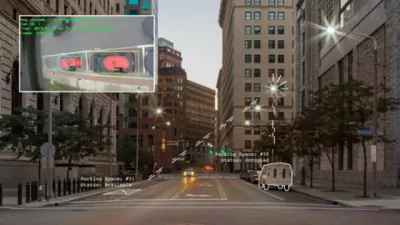In the quest to improve efficiency and effectiveness, "smart" technologies are helping cities become more intelligent machines. But a growing chorus fears the side effects of increased privatization, surveillance, and technological sophistication.
"The smart city has become a buzzword in urban planning and university engineering departments, and a topic of breathless coverage in science and business magazines," says Courtney Humphries. "Although today the vision exists more in the realm of promise than reality, cities such as Boston have begun to invest time and chunks of their budget to laying the groundwork."
"But as political leaders, engineers, and environmentalists join the smart-city bandwagon, a growing chorus of thinkers from social sciences, architecture, urban planning, and design are starting to sound a note of caution. Building a new, intelligent urban infrastructure could be every bit as momentous as building a water supply, or roads, or a subway system—setting development patterns for decades. Though they share enthusiasm for what a smart city could do, they also point out that smart-city programs could—with little public oversight—put us on track to a kind of urban future that not everyone thinks is ideal."
What's at stake may be the soul of the city itself: the Platonic ideal of the "the orderly, manageable city" versus the "chaotic and dynamic whirl of activity."
FULL STORY: The too-smart city

Maui's Vacation Rental Debate Turns Ugly
Verbal attacks, misinformation campaigns and fistfights plague a high-stakes debate to convert thousands of vacation rentals into long-term housing.

Planetizen Federal Action Tracker
A weekly monitor of how Trump’s orders and actions are impacting planners and planning in America.

In Urban Planning, AI Prompting Could be the New Design Thinking
Creativity has long been key to great urban design. What if we see AI as our new creative partner?

King County Supportive Housing Program Offers Hope for Unhoused Residents
The county is taking a ‘Housing First’ approach that prioritizes getting people into housing, then offering wraparound supportive services.

Researchers Use AI to Get Clearer Picture of US Housing
Analysts are using artificial intelligence to supercharge their research by allowing them to comb through data faster. Though these AI tools can be error prone, they save time and housing researchers are optimistic about the future.

Making Shared Micromobility More Inclusive
Cities and shared mobility system operators can do more to include people with disabilities in planning and operations, per a new report.
Urban Design for Planners 1: Software Tools
This six-course series explores essential urban design concepts using open source software and equips planners with the tools they need to participate fully in the urban design process.
Planning for Universal Design
Learn the tools for implementing Universal Design in planning regulations.
planning NEXT
Appalachian Highlands Housing Partners
Mpact (founded as Rail~Volution)
City of Camden Redevelopment Agency
City of Astoria
City of Portland
City of Laramie




























